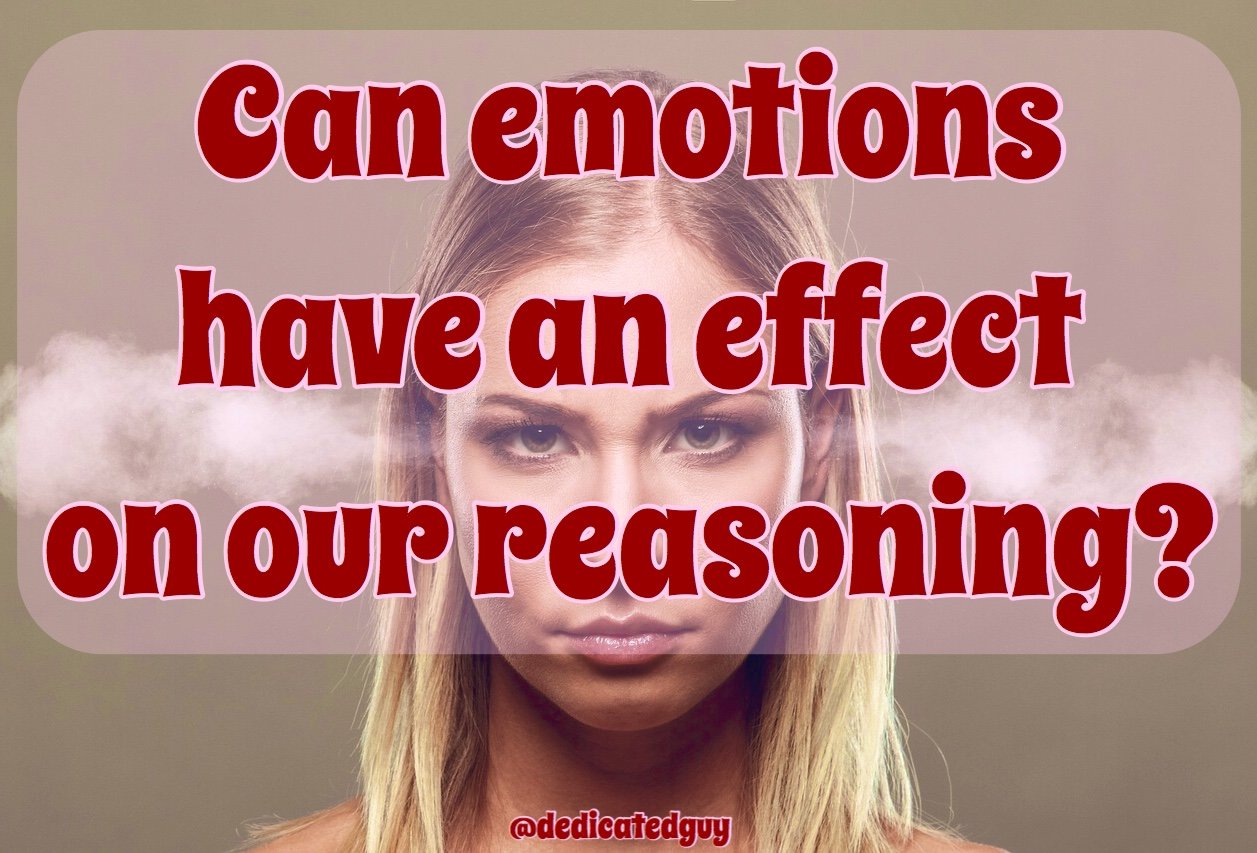
On a day-to-day basis, emotions are part of our behavior and personality, they guide us in our permanent search for satisfaction and well-being, and they help us to avoid the harm and discomfort that can threaten our physical and psychological health.
However, such important benefits carry some side effects. There are times when emotions play a trick on us, even when we have full mental health.

What is emotional reasoning?.
… whenever someone concludes that their emotional reaction to something thereby defines its reality, they’re engaged in emotional reasoning. Any observed evidence is disregarded or dismissed in favor of the assumed “truth” of their feelings. | Source
As the name indicates, this type of reasoning is based exclusively on how we feel.

Imagine that we have failed an algebra test, or that we have been dismissed from work. In such circumstances, it is likely that "we feel" that we have failed, then if that is what we "feel", then it must be because we are "really" a loser who always fails. When we are trapped by this type of reasoning we arrive at apparently true conclusions but without following a sequence of logical reasoning, just by paying attention only to how we feel.
Then, an excessive generalization is made from an anecdotal or very specific event. What has gone wrong in an algebra test does not necessarily indicate that we have failed in life. And this is something we do permanently if we are reasoning based on our emotions, we create rapid conclusions and in general, sharp statements, without there being any valid and objective proof that justifies them.
In the same sense, if we feel alone, we can end up thinking that we deserve it, that we are not worthy of being loved, or that we have a defect that drives people away. From there, its easy to conclude that we are going to be left alone for a lifetime.
… emotions are very important for choosing. In fact even with what we believe are logical decisions, the very point of choice is arguably always based on emotion. | Source
The emotional reasoning has another aspect focused on the outside, because we also tend to judge the behaviors or emotional states of others according to how we feel at that specific moment.

If we are angry because our boss denied us a raise, it is much more likely that we will attribute malice to the neighbor who is listening to music at full volume, or that we take as a personal insult the imprudent movements coming from the driver of the car in front of us on the highway.
When we feel angry, we see anger in others, and we are unable to realize that we are really the ones who are angry and project that emotion in other people.

Emotions and their usefulness
All this should not make us believe that the emotions themselves are detrimental to us. It’s better to think about them as a primitive system of communication with ourselves.
It can be considered a primitive system because emotions, as we know them, are much earlier than language. When we were primates that lived in trees jumping around and completely unable to pronounce any sound similar to what we know today as our languages, we already had the possibility, however, of expressing a wide range of emotions.
And this brings us to the second concept: communication system. When people smile at us and their faces light up when they see us, they are telling us, before they articulate any words, that our presence brings them joy. Either they like us in some way, or we do not have to fear them, since they do not keep hostile intentions towards us. These interpretations are valid, of course, depending on the context.

If, at the other extreme, someone stares at us in an ugly way, this is letting us know, without expressing it verbally, that he despises us, detests us, or for some reason feels motivated enough to hurt us. In fact, a lot of animals exhibit their fangs as a form of threat to others. Holding the arsenal of attack is usually an effective intimidating element, or a way of dissuading the other from his intention to attack us.
If we can't trust that emotions will always steer us in the right direction, there is no way around a dispassionate calculation of potential gains and losses. This controlled, quantitative approach is most useful for decisions with clear, measurable outcomes. With economic choices, it's possible to estimate the probabilities of different consequences and to quantify how good or bad those outcomes are. | Source
That is why it is fair to say that the main function of emotions is to communicate attitudes and behavioral proneness, both to ourselves and to others.

Emotions and how we manifest them
It is not necessary for our partner to tell us if she liked or not the birthday gift that we bought her; before she utters a word we already know by the expression on her face. In the same way, we know if our boss is going to give us an increase or we will be fired when we are asked for a private conversation in the office.

When we see someone with his face expressing sadness, without us asking him anything, we have the certainty that he is going through a bad moment, that there is something that is making him suffer. That awakens our interest, our empathy, his emotion acts as a rigger that pushes us to act, to do something in order to help him.
The cooperation between human beings when facing adversity, or when trying to accomplish a common goal, is one of the main components that allowed our evolution and progress as a species.
For example, with babies the different cries communicate to the adult that they are hunger, or annoyed because they wants to change diapers. Every parent eventually manage to figure out the meaning of the subtle tone of her children's cries and what they mean during their first months of life.

Conclusion
When our reasoning is affected by our emotions this can all be seen as mental trick, a kind of delusion experienced as a result of some difficulty to properly understand and handle one's emotions, and can completely control the person's life, making him believe things that are not true, such as that he has no value as a person, that the world is a risky and horrible place, and even that there is no hope that he can get out of that state.
That is, we can end up creating conclusions, and even beliefs based solely on emotions.
But emotions, are very beneficial for the human being, since they play a fundamental role for survival, they are neither detrimental nor a mistake of some sort. They help us when building relationships, strengthen ties, and are the most effective way of developing bonds with others.
Do you think your emotions constantly affect your reasoning or instead you manage to always remain objective?
References
psychologytoday – emotional reasoning
theoryofknowledge – emotion and reason
ncbi.nlm.nih.gov – emotions and logic
bigthink – decisions, emotions and logic
psychologytoday – reason and emotion
Images sources
All images are from pixabay

If these titles sound interesting to you, I assure you the articles will be even better!

How can suggestions affect our lives?
Meet Lympo: the blockchain project that rewards you for leading a healthy and active life.
Why do some people tend to sabotage themselves?
Meet Crowd Machine: blockchain has just arrived to the cloud computing industry!
Let’s talk about emotional shocks!
